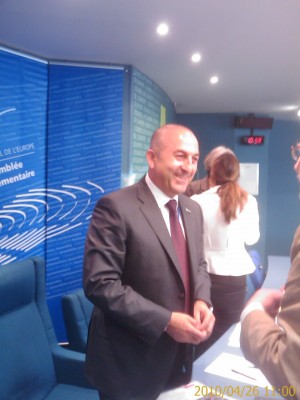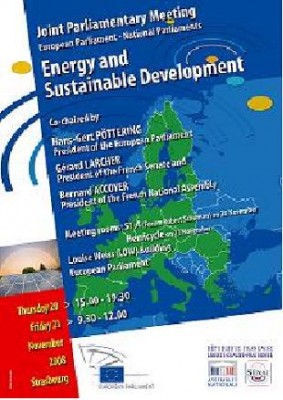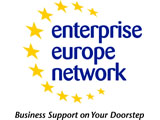 newsitems
newsitems  CoE Assembly Chair Cavusoglu to EuroFora on EU Neighbouring Countries' Democracy link
CoE Assembly Chair Cavusoglu to EuroFora on EU Neighbouring Countries' Democracy link
CoE Assembly Chair Cavusoglu to EuroFora on EU Neighbouring Countries' Democracy link

CoE Parliamentary Assembly's Chairman, Mevlut Cavusoglu, speaking to "EuroFora" at the beginning of an exceptionally important GeoPolitical session in Strasbourg's PanEuropean body, headed by Norwegian SG Jagland, including Ukraine's new President Yanukovich, Russian Foreign Minister Lavrov, Swiss' Foreign Minister Calmy-Rey, etc., stressed his "hope" to advance towards extending a "Democracy" link to all EU Neighbouring Countries.
He made it clear that such moves concern the "Partnership forr Democracy Program", which is co-funded by the EU and CoE, for 3rd Countries around the EU, spreading from Asia to the Southern Mediterranean, until the Middle East, etc.
- On the "Partnership for Democracy" are already involved "Kazakstan, Morroco, Algeria, Tynesia, and Palestine, because they are interested in this", PACE's President replied to an "EuroFora"'s question.
Asked by "Eurofora" if he intends to develop that joint EU - CoE program "during (his) presidency" (i.e.2010-2011), Cavusoglu carefuly but positively replied : - "I might, I hope".
- "I already paid a visit to Kazakstan, as I have informed you, and I want to go to Morocco, may be in Autumn, maybe October or November (2010), and in Bukarat" (Uzbekistan ?), etc., he revealed.
Made before the end of February 2010, the "visit to Kazakstan" aimed "to invite it to the '"Democracy for Partnership Program" officially, he confirmed.
Most former CIS (previously USSR) and Southern Mediterranean Countries are interesting both for Investments, Infrastructures, Trade, etc., and for Oil/Gas Energoy sources.
------------------------------
Cavusoglu got CoE Parliamentary Assembly's Top Job for 2 Years (2010-2011) unopposed on January 2010;, after its Standing Committee, meeting in Switzerland last November 2009, decided to skip earlier plans to extend experienced Spanish MEP Luis de Puig's mandate as PACE President for a 3rd Year, and revived a previous deal on "rotating" Chairmanships between Political Groups, giving the turn to the EDG, whose British President, Wilshire, prefered to appoint a Turkish candidate, instead of a Russian one, whose candidacy, back in 2005, had been silently "freezed".
Turkey has been a PanEuropean CoE Member since the "Cold War" period, (despite a "hard" interval in the 1960ies, mainly after the former Prime Minister Menderes' killing, etc), co-habitating now with Russia, Ukraine, Georgia, Azerbaidjan and Armenia. The decision to select a Turkish MP for PACE President for the 1st time in CoE's 60 Years long History (1949-2009) was taken shortly after CoE's Assembly adopted last year a Resolution on extending participation to CoE's activities, with a special status, from former CIS' countries such as Kazakstan, etc., to South Mediterranean Countries like Morrocco (whose earlier Candidacy to the EU had been refused by EU Commission in the Past), and Middle East, etc. (This was added to an earlier CoE particularity, to be linked, since 1985/6, even to the USA, Canada, Japan, Mexico, etc).
-----------------------
However, on Democracy issues, Cavusoglu had to face today also the denunciation by a Kurdish Journalist of the fact that 2 elected Members of CoE's Congres of Local and Regional Authorities in Turkey, together with a Hundred of other Politicians of the DTP Party, including many Mayors or Regional Councelors, were reportedly arrested, shortly after the Local Elections, a year ago, and many of them are still kept in Prison, even without trial. While "1.300 Children" arrested in demonstrations, usually called "stone throwers", are still jailed, sometimes for 2 years, he added.
On the first issue, (that of jailed Mayors or Regional Councelors), Cavusoglu simply replied that he was going to "meet today with CLRAE's acting President, (Dr. Jan Micallef), and with the (CLRAE) Rapporteurs who are going to visit Turkey, to prepare a Report on this issue, as he said.
After a strage delay since March 2009, now CLRAE can't take decisions before its October 2010 Session, (i.e. only a Month before Turkey takes over CoE's Committee of Ministers' rotating Chair)..
But its Institutional Committee may adopt that Report on June, as its Chairman, a Liberal British representative earlier said to "EuroFora", (Comp. "EuroFora"'s relevant previous NewsReport), and it cannot be excluded that this might be eventually used by the PACE on its June or September next Sessions.
On the "Children who are stone-throwers, this issue is discussed in the (Turkish) Government and in the Parliament. I expect a Law in the very soon future, and I will be following that situation as well", Cavusoglu promised.
-------------------------------------
But, from a GeoPolitical point of view, the most topical question about EU Neighbouring Countries is obviously what will be Ukraine's relations with the E.U. after the recent election of its new President, Viktor Yanukovich, who will make his first appearance in a European Organization tomorrow, Tuesday 27 April, at CoE's Assembly in Strasbourg.
The fact that Ukraine is clearly "a European Country" was officially recognized already during the French 2008 EU Chairmanship, as President Sarkozy had stressed then. But, without excluding anything, the new French Minister for EU Affairs, Pierre Lellouch, observed last week, speaking to Journalists including "EuroFora", in Strasbourg, (Comp. other Lellouch's statements to "EuroFora", published in a different newstory). that Ukraine "needs Stability", and to focus on strengthening its Economy, for the Time being.
However, while French President Sarkozy had notoriously citted only at Russia and Turkey as neighbouring big countries that EU should link closer by establishing Privileged Partnerships creating a larger "common Area of Security and Prosperity", on the contrary, Lellouch, (a notoriously former advocate of Ankara's controversial EU bid), also pointed at Ukraine.
Other EU politicians, (included new EU Commissioner on Enlargement, Fule), questioned recently by "EuroFora", stressed that "it's for Ukrainians to decide" whether they want to advance towards a candidacy to EU Accession, or if they prefer a kind of "Privileged Partnership", or any other closer, Strategic link to the EU, always playing their natural role as a kind of "Bridge" linking the EU to Russia.
Naturally, everybody is aware of the fact that it would be a Paradox to keep as "Candidate" Turkey, which is geographically located mainly in Asia, with its own specific Cultural Identity, and still exceptionaly grave Human Rights/Democracy issues, while eventually refusing that to Ukraine, an unquestionably European Country, both Geographicaly and Culturally, with comparatively much more lenient Human Rights/Democracy issues now, and well developed on Education/Scientific Research and Technology matters, (including the famous "Antonov" Airplanes : See "EuroFora"'s earlier NewsReports on that interesting aspect of possible EU - Ukraine cooperation on Avionics).
Among others, f.ex. on Freedom of Expression and Journalists' murders, Ukraine has already acted in the Gongadje case, by finding, judging and condemning to Jail at least 3 suspects for the Murder, accepting even International Experts' for Investigation, etc., while, on the contrary, Turkey, despite being condemned by ECHR in the case of the Murder of Turkish Cypriot Dissident Journalist Adali, the same year 2005 as ECHR published its obviously related judgement on the Gongadze case, hasn't yet done anything ,notabe to make an efficient investigation, nor ever found anyone among those responsible for the Journalist's deadly shooting...
. But, at the present point, it's for the new elected President of Ukraine, Viktor Yanukovich, to outline his GeoPolitical View, tomorrow in Strasbourg.
Main Menu
Home Press Deontology/Ethics 2009 Innovation Year EU endorses EuroFora's idea Multi-Lingual FORUM Subscribers/Donors FAQs Advanced search EuroFora supports Seabird newsitems In Brief European Headquarters' MAPs CoE Journalists Protection PlatformBRIEF NEWS
- 00:00 - 02.06.2021
- 00:00 - 18.10.2020
- 00:00 - 19.06.2020
- 00:00 - 18.05.2020
- 00:00 - 20.04.2020
- 00:00 - 02.02.2020
- 00:00 - 09.12.2019
- 00:00 - 27.11.2019
- 00:00 - 16.11.2019
Popular
- Yes, we could have prevented Ferguson riots says World Democracy Forum's Young American NGO to ERFRA
- Spanish People Elect CenterRIGHT Majority with 1st Party and Total of 178 MPs (6 More than the Left)
- Pflimlin's vision
- The European Athletic "Dream Team", after Barcelona 2010 Sport Championship Results
- Source Conseil d'Europe à ERFRA: Debatre Liberté d'Opposants à Loi livrant Mariage+Enfants à Homos ?
- Head of BioEthics InterGroup, MEP Peter Liese : "Embryonic stem cell research reaching its END" !?
- Spain: Jailed Turkish Terror suspect with Explosive,Drones,Chechen accomplices stirs Merah+ Burgas ?
- UN Head Ban Ki Moon at CoE World Democracy Forum : - "Listen to the People !"
Latest News
- EUOmbudsmen Conference 2022: Digital Gaps affect People's Trust threaten EF Project on EU Future ?
- French Election : Black Out on Virus, but Obligation for Fake 'Vaccines" Challenged
- Both French Presidential Candidates point at "Humanism" in crucial times...
- France : Zemmour = Outsider may become Game Changer in Presidential + Parliamentary Elections 2022
- PACE President Cox skips Turkey Worst (Occupation) case compared to Russia (DeMilitarisation) query
Statistics
Visitors: 59717141Archive
Login Form
Other Menu

Strategically located between Paris and Prague, Strasbourg offered a natural location for the French and Czech EU 2008 and 2009 Presidencies to tune their agendas for a resolute European move towards Renewable Energies, during an exceptional Joint Parliamentary meeting on "Energy and Sustainable Development", co-organized here by the Presidents of EU Parliament, Hans Gert Poettering, French National Assembly, Bernard Accoyer, and Senate, Gerard Larcher, on November 20 and 21.
Concluded by a busy-looking French super-Minister of Energy, Environment and Regional planning, Jean-Louis Borloo, the exceptional gathering of Top MPs from all 27 EU States' Parliaments hoped that a Ministerial meeting prepared by Borloo, will pave the way to an overall agreement at the level of EU Heads of State and Government Summit chaired on December 2008 by French President Nicolas Sarkozy, allowing the next EU chair, the Czech Republic, to start working from the beginning of 2009 on concrete measures.
Speaking to "EuroFora" President Accoyer resumed the general feeling by stressing that "Europe has no Oil-Gas resources, but an important Scientific-Technologic potential. Therefore, we must develop Renewable Energy sources". "Since the Sun is the most abundant and free RES, we must do the outmost to boost Solar Energy" solutions, he added, at the eve of a special meeting on Solar energy and the Mediterranean organised by Borloo on Saturday.
Oil-gas supplies' security and diversification were also examined by the EU gathering, after which, President Accoyer replied to our question on risks of long, expensive and fragile pipe-lines' projects, crossing through foreign countries out of the EU, compared to new possibilities for Sea and River Ship direct EU transport even of Gas, thanks to New Liquification technologies : - "We have just écreated the Union for the Mediterranean for concrete projects like these", Accoyer stressed, speaking of Sea-River Ship Highways, fundeable under EU's TENS programs.
Rapporteur on "Energy innovation and sustainable development", Dr. Bedrich Moldan, vice-President of Czech Senate's Environment and Regional Development Committee, added that Climat issues, price uncertainties and diminution of accessible Fossil energies, played together with EU's RST potential in order to make RES both a need and "an opportunity". However, in cases as "Solar Energy, even if the main Scientific ideas are already here, we have to make some technologic breakthroughs in order to find how to produce it on a large scale, store and transport it", Dr. Moldan added to "EuroFora".
Czech interest for RES was also expressed, earlier in Strasbourg, by Jan Kohout, the deputy Minister pf Foreign Affairs who participated to a workshop on "Renewable Energies" organized by the French EU 2008 Presidency : - "The focus is on Development", he told us.
On this and other RES issues, Dr. Moldan anounced the Czech EU 2009 chair's intention to organize an important 2-days Conference on Renewable Energies and Sustainable Development late January 2009 at nearby Prague.


















